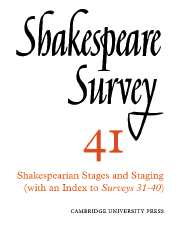Book contents
- Frontmatter
- The Shakespearian Stages, Forty Years On
- The Original Staging of The First Part of the Contention (1594)
- Charles Calvert’s Henry V
- Hamlet, An Apology for Actors, and The Sign of the Globe
- ‘Hid indeed within the centre’: The Hall/Finney Hamlet
- Malvolio and the Dark House
- The Text of Cressida and Every Ticklish Reader: Troilus and Cressida, The Greek Camp Scene
- Antony and Cleopatra, Act 4 Scene 16: ‘A Heavy Sight’
- The Tempest’s Tempest at Blackfriars
- Keats and Lucrece
- The Resources of Characterization in Othello
- Ovid and the Mature Tragedies: Metamorphosis in Othello and King Lear
- The Passing of King Lear
- Shakespeare Performances in London and Stratford-upon-Avon, 1986–7
- Professional Shakespeare Productions in the British Isles, January–December 1986
- The Year's Contributions to Shakespeare Studies: 1 Critical Studies
- 2 Shakespeare’s Life, Times, and Stage
- 3 Editions and Textual Studies
- Books Received
- Index to Volume 41
- General Index to Volumes 31-40
3 - Editions and Textual Studies
Published online by Cambridge University Press: 28 March 2007
- Frontmatter
- The Shakespearian Stages, Forty Years On
- The Original Staging of The First Part of the Contention (1594)
- Charles Calvert’s Henry V
- Hamlet, An Apology for Actors, and The Sign of the Globe
- ‘Hid indeed within the centre’: The Hall/Finney Hamlet
- Malvolio and the Dark House
- The Text of Cressida and Every Ticklish Reader: Troilus and Cressida, The Greek Camp Scene
- Antony and Cleopatra, Act 4 Scene 16: ‘A Heavy Sight’
- The Tempest’s Tempest at Blackfriars
- Keats and Lucrece
- The Resources of Characterization in Othello
- Ovid and the Mature Tragedies: Metamorphosis in Othello and King Lear
- The Passing of King Lear
- Shakespeare Performances in London and Stratford-upon-Avon, 1986–7
- Professional Shakespeare Productions in the British Isles, January–December 1986
- The Year's Contributions to Shakespeare Studies: 1 Critical Studies
- 2 Shakespeare’s Life, Times, and Stage
- 3 Editions and Textual Studies
- Books Received
- Index to Volume 41
- General Index to Volumes 31-40
Summary
'Editing might... be provisionally defined as a total waste of time which periodically reconstructs our image of the past.' Gary Taylor ends the first paragraph of his introduction to the Oxford Shakespeare's Textual Companion with this quip about the double-bind in which editors are caught: those who evade ridicule as pedantic drudges fussing over trivia expose themselves to charges of recklessness, presumption, and cultural vandalism.
Nobody is likely to dismiss the Oxford editors' prodigious labours as inconsequential drudgery. They have produced two separate volumes of Complete Works, one in old spelling and one modernized, that are spectacularly unlike any other. Reviewers wishing to convict them of 'hurlyburly innovation' that threatens a national monument as the Percies threatened King Henry the Fourth's state must somehow demolish Taylor's general defence of the editors' procedures, rebut the evidence supporting hypotheses about the textual histories of individual plays, and challenge the arguments with which the four editors have justified their choices of variants and their emendations. 'No edition of Shakespeare can or should be definitive', writes Taylor. 'Of the variety of possible and desirable undefinitive editions one asks only that they define their own aims and limitations: that they be selfconscious, coherent, and explicit about the ways in which they mediate between writer and reader' (TC, pp. 3-4).
- Type
- Chapter
- Information
- Shakespeare Survey , pp. 228 - 245Publisher: Cambridge University PressPrint publication year: 1989

